
Pretty much from the beginning of this site, and thus way back in the days of the VHS tape, I maintained that the last, great untapped source of Jabootu fare was the bad TV pilot. Sadly, these have historically been nearly impossible to track down. A few were released to VHS, but few indeed have made the transition to DVD.
Even so, with a number of overly ripe, long-lusted-after candidates dancing around in my ahead, and in the age of cheap Mill Creek DVD packs, grey-market DVD-R agoras like ioffer.com, and for the somewhat more technically inclined, the torrent sites, I figured at least several of these promising subjects would be readily available.
Sadly, it was not so. Despite sending out the call for roughly half a dozen candidates, none proved readily available even via these means. I quickly grew amazed, then depressed, then nervous. Luckily, my ass was saved by my longtime colleague Scott Hamilton of Stomp Tokyo. He saw my list of wannabe subjects and offered me one of my most longed after; the 1992 failed pilot Steel Justice.

The early ‘90s was a golden age for Bad TV Pilots, an era in which herds of wannabe Glen A. Larsons (including, most prominently, Larson himself) roamed the land. These savvy producers issued forth a slew of pilots which typically were tossed together using the following recipe:
1) An often fantastical but always retarded central premise.
2) A tendency to rip off an at least somewhat recent popular movie or TV show. Sometimes two, with the classic TV show The Fugitive quite often being part of the mix (The Hulk, Run Joe Run, about a billion others).
3) A Hasselhoff-esque lead; i.e., big, buff, bouffanted and blandly studly, but an inert block of petrified wood in terms of acting ability and charisma.
Today’s subject hits all these notes. A sort of tridreckta, one might say.
Since I (not to mention much of anyone else) had not seen our subject since it first aired nearly—good grief!—20 years ago, I was a tad worried that I had misremembered and inflated its Jabootuish traits. Then I popped Scott’s DVD-R into the player, and such fears were rapidly assuaged. In the first five minutes alone I laughed so hard my vision grew opaque with tears. Even better, although I had remembered the picture in rough terms, I had forgotten many of the particular details. This allowed me to enjoy them again as if for the first time.
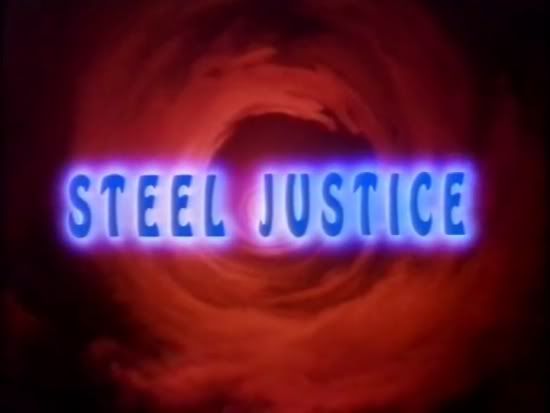
We open with a sci-fi movie warp tunnel effect, accompanied by equally generic, albeit spritely, sci-fi music. Sadly, instead of something interesting, like a TARDIS, we get the title appearing over this. Then we move on to some old timey maps as the credits are displayed. The music grows somewhat more exotic, like the theme of a knock-off Sinbad movie from Asylum. We then cut from the maps to Sped-Up Cloud Effect, over which is laid a 2001: A Space Odyssey / Doctor Who warp effect. Clichés ahoy!
This being a sci-fi pilot from an era in which networks didn’t believe mainstream viewing audiences would ken such things, we open with the Obligatory Expository Narration. This is read by character actor J.A. Preston, whose voice is augmented with a reverb effect (wow!). Angelic music is heard to lend the following a Note of Awe:
“Since Time Began, time travelers have journeyed across the globe [hence the tracking shots of ancient maps, get it?] on a pilgrimage, a quest to locate and nurture those with The Gift. Only a handful of people throughout history have been blessed with this gift, a gift of Transformation. Now, you must learn to listen to your dreams…”
Cue banjo chords and track down to a swamp, where a frog…. Oops, sorry. I was daydreaming about a better movie.
Cut to two robed figures in Ye Oldey Times. They are standing over a circle of small, upright stones which are barely visible due to an overindulgence of dry ice fog. One of pair is our Immortal Narrator (the aforementioned J.A. Preston). As he gazes on, the bearded dude next to him assumes a quaky “I’ve got the power!” expression. Suddenly some off-camera grips turn on a bunch of Klieg lights, and there’s a blare of organ music and bam! There’s Stonehenge.
Seriously. I mean it. I told you this thing had barely started before I had burst out laughing.
But a better, or at least even more risible, part is yet to come. Cut to the Immortal Narrator with another dude, this one dressed like an ancient Greek soldier. He’s whittling a shoebox-sized horse, and before I could gasp, “No way!”, cue the Klieg lights and blaring organ music and bam! There’s the Trojan Horse.
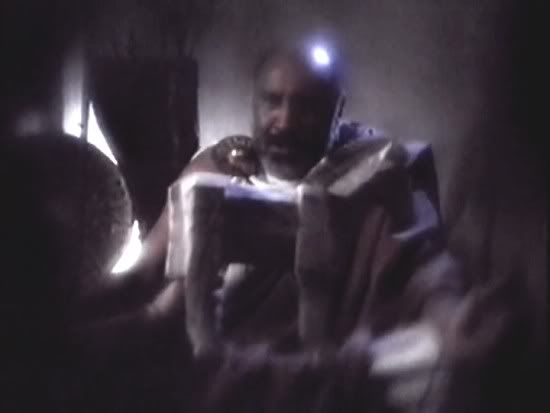
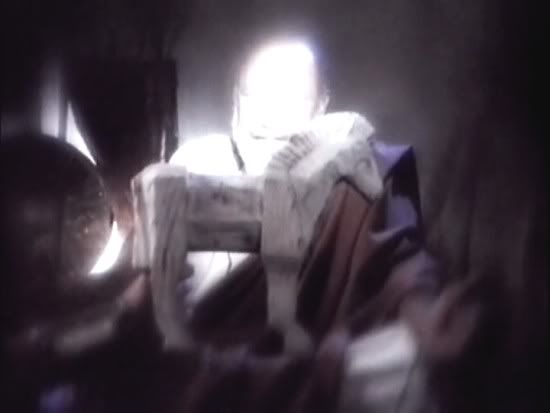
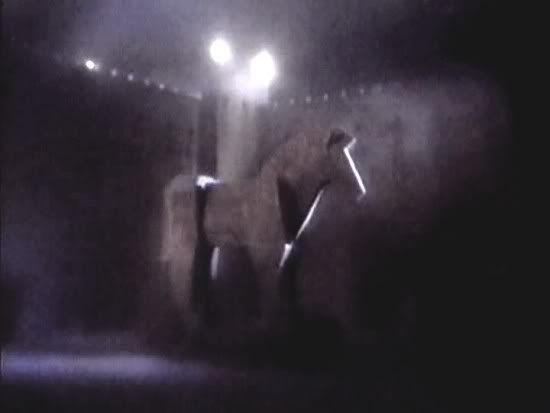
That just happened.
Now as funny as it is to consider that the Greeks were too lazy to actually build themselves a big hollow horse, and instead just subcontracted the whole thing to some guy who used the mystical power of Transformation—not to mention Whittling—to craft one instead (presumably Greece had less violent labor unions back then, because a crapload of carpenters were just put out of work), that’s just scratching the surface.
You see, the viewers of the time already knew from advance publicity and commercials and such that the plot revolved around a cop in a Blade Runner-ish future who fought crime by magically turning his dead son’s favorite toy, a remote control robot T-Rex figure, into a 40 foot tall, fire-breathing somewhat mobile ‘robot’ prop inevitably dubbed Robosaurus.
Given this, raging mirth is the only proper response to the notion that this immortal guy had traveled the globe, training (for instance) the guys who made Stonehenge and the Trojan Horse, just so that millennia later he could similarly teach a self-pitying, sad sack cop to use the same powers to turn his dead kid’s dino doll into a big, goofy flame-throwing robot to help him fight drugs dealers and the like. Presumably the Immortal Traveler’s next gig after this will be to help a guy in Slovenia in the year 2179. There he will instruct his student on how to Transform a pair of desk scissors into some giant sheers, which will be used to open a new, highly futuristic but dystopian strip mall.
Anyway, this all proves to be (wow!) a Dream of Portent from which wakes Our Hero, one Detective Lt. David Nash. He is clearly befuddled by this vision. Technically, you see, it’s All Still Supposed to Be a Mystery. At least assuming, again, that you hadn’t seen all the TV commercials and such. Anyway, David has been taking a cot shift at a stakeout in a highly stereotypic seedy apartment room, one inevitably strewn with fast food wrappers, etc.
Waking, he is greeted by his partner Gina Morelli (Season Hubley!). Although I can’t say for sure, I for some reason suspect she might be of Italian extraction. Gina’s bona fides as a brassy dame, meanwhile, are quickly established by her habit of chewing a wad of gum while spitting out hardboiled (sort of) witticisms in a smoky voice. Gina asks if this dream was “the same one about Davey,” but David cogently replies no, that it “was like back in History.” Hey, he’s a police detective, not a Brain Guy.
“There was this black guy,” David explains, “he’s traveling in time, and he’d find these different people and teach them how to do these weird things.” Man, I hope he’s not talking about Michael Jackson. Oh wait, no. He said a black guy. “Like how to change little things into big things,” he elucidates. “Pebbles into Stonehenge. A small wooden carving into this Trojan Horse.”
Man, that description sounds like a really bad TV pilot pitch, doesn’t it? Gina apparently thinks so, as she aptly rolls her eyes upon hearing all this. This, needless to say, is a far more rational response than handing somebody a check for x number of millions of dollars and saying, “Make that movie!”
It should be noted that Taylor has either chosen or was assigned to give his character what I suspect is meant to be a fairly broad Bronx or Brooklyn-esque city accent. I can only guess they thought such a thing would tie in with the movie’s general 1940s motif. The problem is that the accent comes and goes. And when it’s there, it waxes and wanes from scene to scene. Perhaps an embarrassed Taylor dumped it as soon as he could, figuring nobody would notice and proving correct in that assumption.
David takes over the watch so that Gina can grab a nap. Grumbling, she complains that they wouldn’t be stuck here if it weren’t for David’s “blind snitch.” Yep, every TV cop needs their own Huggy Bear. David stands up for his source, needless to say. “My ‘blind snitch’ can read the copy right at the bottom of the eye chart,” David retorts. Uhm, OK.*
[*The snitch never actually shows up, so presumably he was being seeded as character for the *cough* upcoming series. Or maybe he was meant to be a gag on David’s part. We never really find out.]Gina’s rest is cut short by a radio message from their superior, Lt. Bill Somes. Their walkie-talkie has a videoscreen, by the way, our first indication that this takes place in The Future!! (Well, The Future as envisioned in 1992 by way of Blade Runner.) Somes reports that “Gomez”—oh, brother—is on the move. Gina questions David with concern as they make ready to intercept him, suggesting *gasp* a dark backstory between Our Hero and this Gomez fellow. [Which never materializes, but anyway.] Meanwhile, no, sadly, it’s not Gomez Addams we’re talking about here, although that would have been awesome.
Cut to the nighttime street outside. Muddling things further, David now takes over the Expository Narration duties from the Immortal Traveler, spitting out a tremendously long and unwieldy wad of the stuff:
“The 21st century.[1] Things have sure changed, not all for the better. The environmentalists were right.[2] Widespread use of fluorocarbons in the last 20 years has all but destroyed our planet’s ozone [3], making our once temperate climate hot. My name’s David Nash. I’m a cop working the B Sector of the City[4], my partner and I are attached to a specialized police unit.[5] That’s Gina Morelli, my partner and best friend for the last six years. I’d be lost without her.[6]
After the Central Asian Wars of the late 1990s, it seemed as if the whole world had moved here. This resulted in grossly overcrowded conditions and clashing cultures.[7] We’d become a 24 hour a day world![8] The violent crimes and domestic turbulence had reached an all-time high.[9] The rest of the team—actually, we’re more like family[10]—Lt. Bill Somes; Sgt. Julio Melendez; my buddy, Det. Steve Totten[11].
Tonight is the culmination of six months of intense investigation. We set up the sting to nab Arturo Gomez, one of the most vicious, hardened criminals we’ve ever encountered. Gomez specializes in human torment; extortion, pornography [12], peddling heavy-duty street drugs [13] to school kids. And deadly weapons; high-tech, high-powered, high-casualty killing machines.
He was holed up in this downtown fleabag [hotel]. Unfortunately, I was totally unprepared for what was about to happen….”
****
[1] Wow! Imagine!
[2] Things really have changed then.
[3] Kudos to the filmmakers for also cribbing a plot element from Highlander 2.
[4] THE FUTURE!!!!
[5] Along with Frank Drebbin and Ed Hocken.
[6] Uh, oh!!
[7] Uhhh, who is he telling all this too? Does he actually know he’s narrating a movie?
[8] THE FUTURE!!!
[9] As explicated elsewhere by Rita Coolidge.
[10] Awwww!
[11] Since the two Hispanic characters are named Arturo Gomez and Julio Melendez, I thought it only fair that Steve Totten have a more appropriate name. So I entered his into the Black Name Generator—thank you, Internet!—which suggested the more apt Jerome Chocolate.
[12] Oh, yeah, this is before the Internet had really caught on.
[13] But, those are the worst kind!
****
Everyone get all that? Anyway, movie, thanks for using the ‘show, don’t tell’ approach.
It’s during all this that we figure out the whole Blade Runner thing. I mean, it’s not like you’d assume a movie made in 1992 would be so nakedly ripping off one made back in 1982. Way to stay timely, Network TV.
In any case, an array of patently *cough* homaged elements makes the inspiration clear; the protagonist’s narration, the retro 1940s motif seen in the cloths and decor, which rubs shoulders with markedly cheap-looking ‘future’ cloths often made of transparent plastic, the crowded urban conditions and cultural mixing, the street venders, the environmentally-sourced bad weather, a plethora of open umbrellas (despite a lack of rain) etc.
By the way, despite the oft mentioned and supposedly omnipresent heat, most people here are never seen sweating, and most also wear many layers of cloths. You know how tons of people now routinely wear golf shirts and shorts as their daily garb, despite our own intact ozone? Not so much in this universe. For instance, our hero wears over his regular togs a long brown overcoat, much like, oh, I don’t know….
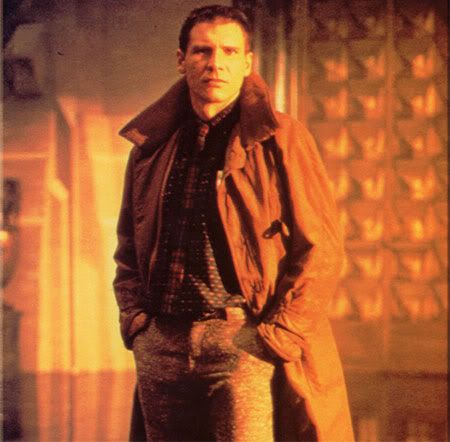
Anyway, with the rest of the team arrayed on the street below, David and Gina head up and station themselves outside Gomez’s hotel room door. You might think such a “vicious and hardened” arms dealer would draw the use of a SWAT team or some feds or something, or at least an entire team of cops in riot gear and equipped with a battering ram. But nope, it’s just these two, drawing their guns and standing to the side of the door before using a moronic ruse; Gina tosses some lit newspaper in front of the door and starts yelling “Fire!”*
[*Their original scheme was much better, but David forgot to bring the paper bag with the dog doo in it.]However, rather than Gomez rushing blindly into the hall in a panic, where David and Gina await, instead a fusillade of shots cuts through the paper thin door. Actually, the adjacent walls are paper thin, too, so good thing Gomez didn’t think to spray bullets through those while he was at it. “Good work, Morelli!” David pauses to say. “I said ‘fire,’ he fired!” she quips in return. Anyway, Gomez should be safely reloaded now, so you two can go barging in.
These shots, I guess, were what David was “totally unprepared for.” Sure, he would be, right? Who could possibly anticipate such a response from “one of the most vicious, hardened criminals we’ve ever encountered,” specifically one who sells “deadly weapons; high-tech, high-powered, high-casualty killing machines.” Such a thing would be utterly unexpected!
So David kicks in the shredded door (in a better movie he might have put this his foot straight through the tattered wood, where it would have gotten stuck), and the two run blindly in. Luckily for them—to say the least—Gomez isn’t waiting to blast them but has instead hightailed it up the fire escape. Morelli runs for the stars, David also takes the fire escape, shots are exchanged, etc. David’s revolver, by the way, makes a sort of sound that just coincidentally, I’m sure, calls to mind Harrison Ford’s gun in Blade Runner.
Gomez runs along the adjacent roof, yelling “Get out of the way!” to all the people who apparently live up there. Because it’s a Dystopian Future, you know, where people even live on roofs. Personally, I would have thought a truly vicious and hardened criminal would just shoot a few folks, which might more effectively scatter the rest than simply yelling at them, but what do I know?
David follows close behind, as Action Music blares on the soundtrack. It’s here we get something I’ve been waiting to see: a shot of AN INEXPLICABLE SHAFT OF SMOKY LIGHT BEAMING THROUGH THE SLOWLY TURNING BLADES OF AN INDUSTRIAL FAN. Seriously, this is a big exposed fan up on a rooftop. Why would it be backlit? In any case, wow, it took them eight whole minutes to get to that.
The mega-exciting foot chase finally ends as Harrison Ford finally catches up to and shoots down Joanna Cassidy…wait. What? Sorry, I have no idea what I was thinking about there. Man, that’s just weird.
Instead the chase continues. Gomez uses a dropped ladder to cross the span to another roof, then tosses it to be street behind him. Then, in what I must begrudgingly admit is a fairly clever and realistic bit, his blind rush across the roof is halted when he runs full tilt into an unnoticed clothesline.
This pause gives David time to back up and jump for the roof Gomez is currently on. Because it’s an early ‘90s action flick, he fails to make the roof and instead crashes amazingly unscathed through a window a floor below. He somehow recovers from this faster than Gomez does from the clothesline, and runs up to the roof. Man, they are dragging this out.
Gun at the ready, David turns a corner and comes face to face with…gasp…the Mysterious Stranger from his dream! Wow, how unexpected that is. The smiling fellow silently points out Gomez’ location to the stunned cop, who proceeds on his way. And so the chase continues. Argh. Arthur Penn’s The Chase didn’t have this much chasing in it.
Having made it down to the street, Gomez grabs a passing guy as a hostage. (Amusingly, his gun is so gigantically huge that he can’t bring it to bear on his hostage while he’s at his side.) Seeing this, David radios his team, who come running to the scene. I guess all the gunfire didn’t alert them earlier.
Seeing David peeking over the edge of the roof, Gomez pushes his hostage to the ground and unleashes several hundred rounds in his direction. David waits his turn, however, and wounds Gomez with a single shot. Presumably this precision hit was meant to be intentional, which is utterly retarded. It would be pretty unlikely to hit a figure three or four stories below right in the leg, much less at nighttime while the same fellow is unleashing automatic fire at you.
All is not well, though. Catching the bullet, the wounded gunman fires blindly, sadly pumping a few rounds into his hostage. It’s at this point that the rest of David’s team shows up. Nice work, everyone. To make up for any deficiency in the arrest, Totten pauses to jerk around with Gomez’ wound. Somes barks at him to stop it before he queers the collar.
By the way, I really like the part where Somes asks David if he has found “your other witness, the black guy you saw on the roof up there.” This is mostly to remind us, presumably, that the Mysterious Stranger was on the scene. Given that dozens of people were on the roof, and more than that down on the street where the abduction and shooting occurred, it’s somewhat comical that this is the one collaborating witness they believe they must find.
Meanwhile, Melendez comes over to show them Gomez’ gun. He stops to work the action as he does so, apparently since that whole fingerprint thing is overrated. Somes identifies the gun as a Scorpion, noting that they are starting to crop up all over the place. “B-hoppers and cooljuice runners have better stuff than we got!” Gina spits. Hopefully they have better slang, too.
Meanwhile, Somes and Gina discuss Our Hero’s mental state. Gina naturally has her partner’s back. Somes, however, is perturbed about that building-spanning leap David took. “The only kind of guy who makes a jump like that is a guy who doesn’t care if he makes it or not,” he opines. (I’m sure many of the actors who worked on this pilot pretty much felt the same way.)
This thus seems a good moment to reflect on how often Hollywood mistakes ‘grittiness’ for depth. Say what you will about David Hasselhoff in Knight Rider—and I have—the fact remains that he basically played a cheerful, likable character. Notice that his show not only got on to the air, but ran for five seasons and became fondly remembered junk TV classic.
David, meanwhile, is saddled with a Tragic Past that doesn’t make him relatable and deep so much as just a big, boring mope. And really, tacking a ‘dead child’ subplot onto a patently ridiculous story about a guy who uses magic to turn a toy into a big, fire breathing dinosaur-robot is moronic on its face. You’d have to have major chops to get over that hump, and there are none even remotely on display here. We’re here to see the robot dinosaur eat cars, not to mull over our uber-bland protagonist’s haunted psyche.
Cut to David’s apartment, where he is watching the news on his wall-sized projection screen. [The Future!!!] He also fixes up a Jiffy Dinner, which is basically a TV dinner that comes in a self-microwaving serving dish. OK, that’s not too bad of an idea. Not great, but at least somewhat nifty.
Pace my observations above, we sadly are now consigned to watching Our Putative Hero swill booze and engage in—gack—yet more lachrymose narration. This relates how his wife left him following their son’s demise. Man, this thing is getting more entertaining by the minute. Perhaps he’ll follow up with an engaging bon mot regarding how he was recently diagnosed with colon cancer, or maybe speak of the time he accidently ran over his dead son’s beloved dog with a lawnmower.
Cut to Our Hero abed, tossing in troubled sleep. I watched this recently with Joe Bannerman, the proprietor of Opposable Thumbs Films and a former B-Master in his own right. Joe quickly pointed out David’s rather out of place silk sheets and bedcover. I’m sure the idea is that they were left behind when his wife took off, and he keeps them on the bed to remind himself of happier times. Instead, it suggests he has somehow drunkenly stumbled into Fred Astaire’s boudoir.
Anyway, we finally get the inevitable Dream; the one where we see his kid get kacked. As you’d expect, this directly involves little Davey’s beloved Robosaurus. Waiting outside their apartment in the family car, the lad has sent his father back inside to fetch his toy. (For clarity’s sake, the toy will be henceforth referred to as Robosaurus Jr.) David emerges bearing the object, just to time to see a fellow in a passing vehicle fire an RPG (!) in their general direction. Exit Davey, not to mention their automobile. Amazingly, David doesn’t also explain how the car only had one payment left to go.
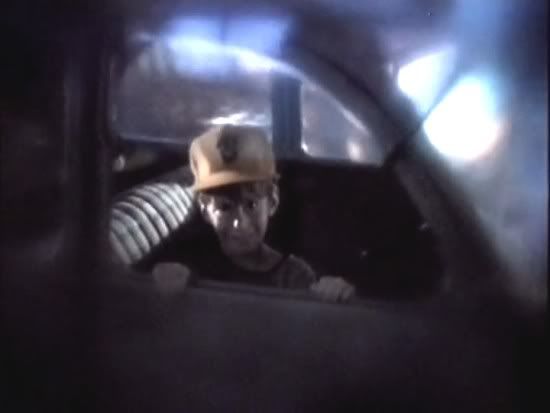
I hope you like this shot. You’ll be seeing it a lot.
The dream has a kicker, whoever. A klieg light flashes forth, and David sees the Mysterious Stranger standing nearby, shrouded by dream-fog. The figure points down the street, where we see Robosaurus Jr. trundling along. It is swallowed by the ever-thickening fog, whereupon emerges a massive, fire-breathing, roaring variant of the toy. And as you’d expect, magically transformed toys and dead kiddies prove an entirely natural and delicious combination, like chocolate and peanut butter. In any case, and I hope you’re sitting down when you read this, but the dream ends with David rearing up in shock.
“The mysterious figure beckoned to me,” David narrates, lest we somehow failed to interpret the (rather literal) dream correctly. I mean, what, we’re Sigmund Freud all of the sudden? Stumbling over to Davey’s room, David opens the door to reveal Robosaurus Jr., patiently awaiting its call to destiny. “It somehow involved the Robosaurus toy Davey and I built together,” he continues. You know, I think some of the pieces are starting to come together.
By the way, surely somebody thought they could sell remote control Robosaurus dolls if the show went to series and proved popular. I mean, it’s hard to believe no one was thinking that. Assuming that’s correct, it’s even weirder that the movie establishes that it belonged to a little kid who we see blown up with a rocket launcher. I’m sure Hasbro would have been all over that.
David hefts the thing up from the floor, examining it. We now get our third narrator (this one accompanied, inevitably, by tinkly music), as he recalls Davey describing his vision for their project together: “Robosaurus. Half robot, half dinosaur. Made of hardest steel, and he breaths fire, too. Protect the good guys, and go after the bad guys. Like you, Dad!”
Having thus situated Robosaurus Jr. more advantageously for a zooming close-up shot, David takes his leave. The camera POV moves closer in on Robosaurus Jr., until suddenly (not to mention inevitably) its red eyes light up on their own accord. I have no idea what that is supposed to suggest. Is Robosaurus Jr. supposed to be independently alive or sentient or something? That makes no sense in the context of the overall ‘Transformation’ thing.
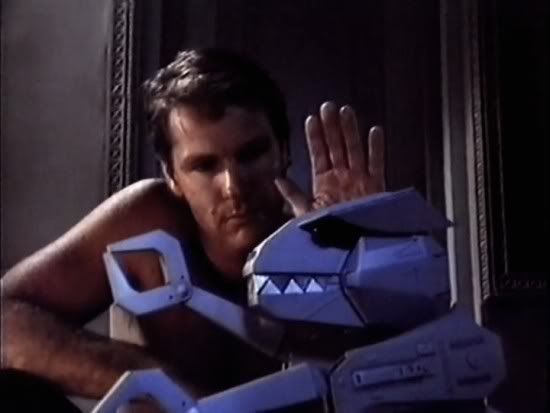

GASP!!!
I fear it was merely thought to be ‘cool.’ Assuming anyone on the set objected that about how inane it was, they were probably told, “Eh, nobody who watches this sort of crap cares if it makes sense or not.” Which, in a nutshell, explains why nearly all genre TV from this period utterly sucks.
Cut to the courthouse where Gomez is being tried. There a recorded face composed of a wall of conjoined TV monitors loudly informs any passing suspects of their myriad legal rights. This is one of several nice—if not always original—little ideas seeded through the film. Too bad they’re swamped by the overall rampant stupidity, not to mention the all too obvious design rip-offs from better known films. Similar walls of monitors, for instance, just happened to be featured in Blade Runner.
To the annoyance of the squad, Totten has bet many of his coworkers that Gomez will, like most of their collars, be acquitted. He cavorts around the hall, uttering shrill little screams and performing little jive steps and spins. Apparently the actor playing Totten was inspired by one of the great African-American film performances of the decade prior; I speak, of course, of Little Richard’s role in Goddess of Love.
Needless to say, a hapless schlub of a prosecutor soon emerges to announce that Gomez was, in fact, acquitted. Apparently Gina’s ploy of setting a newspaper on fire outside his door was enough to get the case tossed. (Wow, tough crowd.) As well, the ballistics on the shell that killed the hostage were inconclusive, and since David was also firing into that general area, blah blah civil rights gone mad, etc.
Meanwhile, they continue the odd use of outdated slang. The epithet ‘shyster’ is used many times, Somes refers to Gomez as a “gink,” and Totten calls the prosecutor a ‘merkin,’ i.e., a toupee for denuded genital areas. That one’s so old that I assume the writers merely wanted to see if they could get an obscure dirty word past the censors. Of course, many people like doing this sort of thing. Just recently Joss Whedon had Loki call Black Widow a “mewling quim” in The Avengers.
It should be noted that the film’s rampant retro-1940s thing, patently borrowed from Blade Runner’s rampant retro-1940s thing, is (surprise) rather more unlikely. Blade Runner was set in 2019, and made in 1982. It was projecting nearly forty years into the future. David’s narration earlier, however, seems to date Steel Justice a mere 20 years, if that, past the movie’s production date of 1992. Assuming that’s correct, well, that’s a lot of vast social change to have occurred in a mere two decades. Not just the fashions, but the omnipresent ‘40s-ish architecture, the mass adoption of ‘40s slang, etc.
Anyway, they do the thing where the arrogant, sneering Gomez comes out and insults them as he walks away a free man. David stops an enraged Gina from wreaking violence on the twerp, telling her “He’s not worth it.” Wow, that’s some highly original writing right there. Can you believe the script for this wasn’t even nominated for an Emmy?
Cut to Louie’s, the cop bar where the team goes to decompress. We can tell it’s The Future, by the way, because the bar interior is (barely) lit via a plethora of neon tubes. The décor also features AN INEXPLICABLE SHAFT OF SMOKY LIGHT BEAMING THROUGH THE SLOWLY TURNING BLADES OF AN INDUSTRIAL FAN.
The squad is here to mutually support one another via the traditional rounds of booze. David, though, calls it an early night, explaining he has Bullet tickets. After he leaves, Somes darkly tells Gina that David isn’t doing as well as she’s been telling them. He explains “the Bullets aren’t playing in town tonight. They’re on the road, in Philadelphia.” You’d think a police detective could come up with a better lie than that, then, but there you go.
I can’t decide, by the way, whether the ‘Bullets’ thing is clever or dumb. The Bullets were Baltimore’s professional basketball franchise in the ‘60s, which moved to Washington in the ’70s and was quickly eventually redubbed The Wizards. There was also an earlier, unconnected Baltimore Bullets franchise in the ‘40s. Given the whole ‘40s motif here, I assume this is a wink to that team, and thus a hint that Steel Justice is set in Baltimore. Maybe?*
Cut to David into his apartment, popping a DVD (or something close enough) into the player, whereupon it is played upon on his wall-sized projection TV screen. Again, THE FUTURE! The disc is clearly labeled “Davey’s 7th Birthday,” no doubt inspiring agonized groaning from about 75% of the hundreds and hundreds of people who ever saw this thing. Less than twenty minutes in and we’re already hating this guy because of his maudlin obsession with his dead kid. I doubt that’s what the filmmakers had in mind.
So up on the screen we watch David and Davey interact. It’s the same (albeit somewhat expanded; we’re now told Robosaurus can also “crush a car, crush almost anything”) conversion we heard in Davey’s narration earlier, in which he explains to his father the particulars of Robosaurus’ skill set. This means we’ve heard the same lines of expository dialogue twice in five minutes. That the film is already so bogged down and repeating stuff we’ve already seen and heard is a dire sign.
It should be noted, though, that this is Robert Taylor’s best acting scene. By this I mean the Taylor watching the home movie, not the Taylor in it. Finally freed of mind-bogglingly over-explanatory narration or dialogue, he is here allowed to simply act. He wears his grief on his face, and with enough reserve that it actually works quite well.
Too bad the movie seems intent on sabotaging his performance throughout the rest of the picture. Frankly, Taylor’s overall performance in the movie is nigh awful. This bit, however, suggests this is more the fault of writer/director Christopher Crow than the beleaguered actor himself. Even here, Taylor’s understand grief is highlighted with unnecessary music, when simple silence would have undoubtedly been more effective.
Anyway, now that we’ve had like our third or fourth scene establishing that David is sad because his young son was murdered, we cut away to a more dilapidated part of town. There Gomez is having a party (IRONIC COUNTERPOINT!) celebrating his acquittal in what appears to be a warehouse space. The attendees beat in a synchronized manner on various at-hand items with drumsticks or bats or whatever, suggesting a flash mob paying homage to Stomp.
The party is interrupted, however, by the arrival of Jerrod, whose appearance causes the attendees to fall silent. That he’s meant to be a twitchy, smiling psychopath type is established by the music and the actor’s performance, which suggests he studied for the role by watching an old James Remar movie. Probably Rent-A-Cop, by the look of things. Anyway, he informs Gomez that “The Colonel” wants to see him. I think we’re about to meet the film’s lead villain. I guess it’s OK that the film offers up such stereotypic Hispanic and black street thugs because the main bad guys are white.
His presence thus demanded, Gomez grabs up a few of his stauncher underlings. They climb into his battered old car—which, of course, looks like it came from the ‘40s—and set out for the gated, heavily armed compound from which the Colonel does his business. Already there is a representative of a rival gang, which we can tell because this guy is black instead of Latino.
Needless to say, this guy has a rather jivin’ way of speaking. Indeed, his first line is literally, “Yo yo yo, Colonel.” Oh, and his name is Tyrone. And he sports a Chris Rock beard, and one ear ring, and an ostentatious gold tooth. Did I mention he was black? (He does have what looks to be a chopstick sticking through this hair, though, because, you know, THE FUTURE!!)
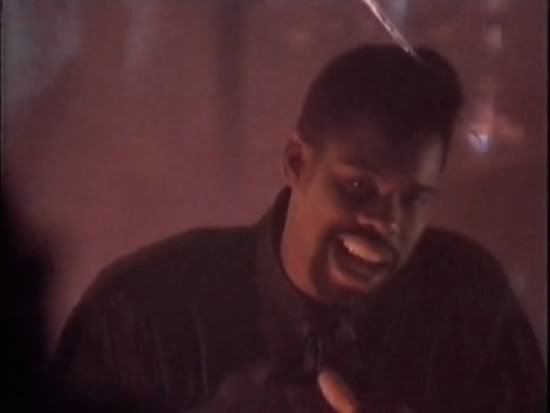
“Kris Rock?! Man, you be trippin’. You know Chris Rokk is the King of Chris Rock celebrity lookalikes! But you better sign me soon. I have a bat mitzvah sniffin’ around me for that same day.”
The Colonel’s office, by the way, is lit with candles, apparently because it was thought to be cool. Hopefully the Colonel doesn’t do much reading in there, because the light levels are terrible. However, the office does feature AN INEXPLICABLE SHAFT OF SMOKY LIGHT BEAMING THROUGH THE SLOWLY TURNING BLADES OF AN INDUSTRIAL FAN. So it has that going for it.
The Colonel is conducting business from his desk whilst holding a small Chihuahua. This can only have been meant to call to mind Blofield and his trademark white cat. Especially since Paris Hilton hadn’t made the scene yet. Closer to mark, the Colonel is played by chubby character actor Roy Brocksmith. I can only assume he is meant to (vaguely) remind us of Sidney Greenstreet’s Casper Gutman from The Maltese Falcon.
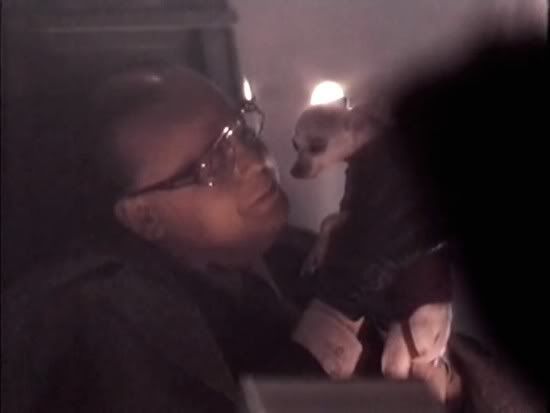
“Don’t worry, my little friend. One quick swallow and it will all be over.”
Tyrone is proving a tough negotiator, while the Colonel assures him that he will beat any of his competitor’s prices. Moreover, he has a new weapon he wishes to show Tyrone, although the latter feigns disinterest. Tyrone several times mentions some of the Colonel’s rivals, the Diaz Brothers, who perhaps were being set up as returning villains had the pilot ever gone to series. I mean, I’m kind of assuming the Colonel won’t be around at that point.
During this haggling session Gomez enters, and he and Tyrone nearly draw their guns on each other before the Colonel clamps down on them. He then expresses displeasure with Gomez’s recent arrest. The Colonel is particularly irked by the fact that one of the Scorpion super-guns he had sold the gangbanger had thus fallen into police hands.
Gomez nervously explains that they returned the gun following his acquittal. However, had they been able to keep their hands on it, the Colonel says, they may well have been able to trace it back to him. (There are numerous logical problems with this scenario, but let’s move on.) Having been properly chastised, a relieved Gomez is dismissed.
Except, of course, for the fact that the Colonel is a silly, Bond-esque villain. Therefore he takes Tyrone up to the roof to demonstrate the weapon he spoke of, which proves to be a shoulder mounted rocket launcher. (Hey, that’s the sort of device used to kill young Davey!) Needless to say, he demonstrates the weapon on the oblivious Gomez’ retreating car. I’d have thought massively blowing up an automobile right outside your own compound would be counter-indicated, but I guess not. Anyway, Tyrone naturally falls in love with the thing following this effective product demo.
Cut to David in a typically dank library, sitting next to some school girls. Why is there so little lighting in the future? I guess there’s supposed to be an energy crisis of some sort, which would also explain the apparent lack of much air conditioning anywhere. (Or, apparently, the Internet. Or cell phones. Really, this was made in 1992. Such things would not have been beyond the ken of imagination by then, surely.) However, the fact that so many characters, including both David and the Colonel, habitually wear overcoats all the time again undercuts this idea.
David is leafing through a book, clearly doing research. “I hadn’t been in a public library since high school,” Our Hero narrates, “but the dream about Davey had been replaying for several months. I could no longer just ignore it and hope it would go away. I had to find out what it all meant.” Yes, reliving how you witnessed your son’s death in dreams. WHAT COULD IT MEAN?!
Cut to David in his own dilapidated, 40s-styled automobile. The car is parked, and he is just sitting in it, looking pensive. Good grief, how could they have possibly thought audiences would want to spend more time with this guy? What a drip. You’re doing something wrong when you make the viewer hate a guy for mourning his young son’s death.
He exits the car, and walks down a very small bit of a standing ‘city street’ backlot, full of things to communicate the state of this exotic future world we find ourselves in. This again includes several people with open umbrellas, despite the fact that we never in the movie see it raining. Afraid of solar radiation, then? Maybe, but no one in the movie wears hats, either. Oh, and somebody is led down the sidewalk on a camel. Seriously. THE FUTURE!!!
David is soon walking along his apartment building hallway. This is, of course, dankly lit, illuminated mostly by AN INEXPLICABLE SHAFT OF SMOKY LIGHT BEAMING THROUGH THE SLOWLY TURNING BLADES OF AN INDUSTRIAL FAN. As he stops to enter his apartment, his neighbor Nicole appears. She is wearing a short if modest black nightgown and open robe, and more importantly, is played by a young Joan Chen. So…Yowsa! Ms. Chen has also been assigned a chic, short hairstyle that just coincidentally, I’m sure, calls to mind that of Sean Young’s in Blade Runner.
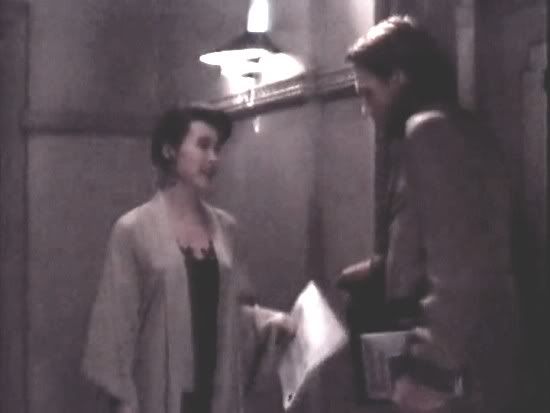
Yes, I’m feeling *real* sorry for this guy.
That Chen has a bit of a crush on David is apparent from the fact that, well, she appears wearing a short if modest night gown and open robe. Not in a slutty way, I should note. However, it’s a rather unambiguous sign that she’s trying to get this guy’s attention. Which shouldn’t be that difficult, really, because, in case I failed to mention it, she’s played by Joan Chen.
Nicole’s excuse for running after him is that “the Post Office,” again mistakenly delivered his mail to her “fax terminal”—THE FUTURE!!! (Why would you use the Post Office to send someone a fax?! And why would it go to a neighbor’s fax machine, even if there was a mistake? Did anyone think through this even for a single moment?)
Obviously, though, this is merely an excuse to talk to him while half-dressed. (Again, though, in a pretty decorous manner.) However, as we know David is mired in his grief, and thus plays it as if there was nothing going on here. Awkwardness ensues, and Nicole fails to get any real response from him, while he attempts to pretend that she’s not sending him signals.
He kind of mumbles a response, and she sees his books on dreams, and uses this to keep the sputtering conversation going. Even after turning to leave, she again returns to try to get him talking. He yet fails to respond, however, and indeed enters his apartment and closes his door on her. We naturally follow David, and now get one of the most annoying bursts of narration I can ever recall: “Nicole was a nice person. She always meant well. I hadn’t meant to hurt her feelings, or be so curt with her. I appreciated her concern, but I felt I had to work this out myself.”
That’s not movie narration, it’s radio drama dialogue. Earlier I mentioned how the film had presented the same information twice in five minutes. This is a central reason why TV is generally so much better now; the idea that the viewer is a complete prat who needs things explained to them SLOWLY AND IN SMALL WORDS AND OVER AND OVER AND OVER AGAIN has largely gone by the boards. (If anything, things have gone too far in the opposite direction; now TV and movies seem petrified to stand still for even a moment, lest audiences grow bored.)
Aside from contempt for the audience, this sort of thing also suggests laziness on the writers’ parts. Why come up with additional plot stuff, or character moments, or really anything, when you can eat up five or ten minutes of running time by covering the same ground again and again? Genius, right?
So the film indulges in scene repetition, which is annoying, while concurrently it uses narration—again, presumably because Blade Runner had narration—in about the worst manner possible. As I’ve observed in the past, back in the early days of comic books you sometimes got this thing where a panel would feature a caption spelling out what the art explicitly portrayed.
“Superman lifts the car over his head!” the panel would read, accompanying a picture of…Superman lifting a car over his head. This suggests unsureness as to whether readers could interpret basic imagery. The narration here is used in the exact same manner. Things that are conveyed entirely well through the acting are then verbally re-explained to us as if we were five year olds. Actually, five years olds would be able to figure out the scene (“she likes him, but he is sad”), so it’s worse than that. Frankly, it’s more than a tad insulting.
The viewers of Steel Justice were not the only ones ill-served by these traits. Earlier I mentioned how I was starting to think Robert Taylor wasn’t fully responsible for his bad performance. As the film progresses, this impression grows. It’s increasingly clear that Taylor was victimized at least to some extent by poor writing and directing. The notion of a veteran actor coming to America from foreign shores, hoping to hit the big time only to find himself made to look like a talentless, uncharismatic chump, is growing more credible as things progress.
Here we have a very simple scene. A beautiful young woman is clearly interested in a hunky, damaged neighbor. Meanwhile, he can obviously see what a prize she is, but is not ready to become emotionally entangled again. A pretty simple idea, really, especially since it’s one that audiences have seen hundreds of times before.
At his disposal the writer/director has at least one actor already known to be quite good (Joan Chen; she starred in The Last Emperor for heaven’s sake), and one possibly good actor—Taylor’s long and continuing career suggests rather more talent that is evinced here, certainly—who indeed effectively sell a rather standard scene with little effort.
I mean, this isn’t Shakespeare here. Chen and Taylor clearly communicate that these two are at least tentatively attracted to each other, as well as the mutual awkwardness resulting from David’s pointed avoidance in acknowledging this. A clear, familiar situation set up in thirty seconds, one presumably meant to pay long-term dividends if the pilot went to series. Even if Chen dropped out for whatever reason, another comely actress could be inserted in her place, rather like a widget. Again, this is pretty basic plot mechanics.
Instead, a nicely played, if rather generic, little scene is pretty well ruined by the implication that the viewer just can’t be expected to comprehend all this on their own. As with the comic book panel cited above, the utterly extraneous narration suggests a condescending assumption that the audience needs to be spoon fed even the most obvious information.
Indeed, the comic panel is entirely less insulting in this regard. Comics as an art form was in a nascent stage at that time, and so structural issues like this were still being shaken out. Sort of how early silent films often made the acting too big. This was a tendency which grew less pronounced as filmmakers learned exactly how much emphasis audiences required.
Well, Steel Justice was made in 1992. Audiences were pretty media savvy by that point, even if network television was apparently terrified to trust that this was true. Bad pilots of today still share problematic traits with ones from this era, but this particular flaw is generally not one of them. Thank goodness for that.
So David looks over his dream books. “…schizophrenic often experiences disjointed, highly unusual dreams where conventional Freudian and Jungian symbology cannot be acquired,” he reads. Good thing normal people’s dreams are never ‘disjointed’ or ‘highly unusual,’ whatever that means. I assume the above is meant to be a gag regarding how the books are woefully arcane and academic. (Because there’s no mass culture interest in dream interpretation, I guess.)
However, given the way it’s played, it’s also possible that instead David is meant to fear that his dreams suggest he’s going nuts. Although I’m not sure exactly what in his dreams would prove opaque to “Freudian and Jungian symbology.” Is it the recurring image of his murdered son’s favorite toy turning into a giant, avenging monster? Yeah, that’s pretty unreadable.
Suddenly, David hears a noise coming from the upstairs (?) level of his apartment. He pulls his gun and sneaks up there, throwing open the door to Davey’s room to find…nothing but Robosaurus Jr. sitting unmoving on the floor. Cue useless narration: “I didn’t know what to make of it. I was sure I’d left the toy in the hallway. I knew that no one else had access to my apartment.”
Weirded out, David again picks the figure up, this time stowing it inside Davey’s old closet. He shuts the door behind him, whereupon…Robosaurus’ eyes mysteriously light up of their own accord. Like they did earlier. This just gets more surprising each time.
By the way, even assuming Robosaurus Jr. is alive in some manner (what that has to do with the Transformation thing, I have no idea), and thus can move around on its own…how the hell did it open the door to Davey’s room and then close it behind itself? It’s not tall enough to reach the doorknob, and it lacks any sort of wrist that would allow its pinchers to twist the knob if it could. As always, lazy writers always assume magic means there doesn’t have to be any sort of internal logic to things. Thankfully that’s an attitude we see less of these days.
We cut outside where the Mysterious Stranger is standing silhouetted under the street’s sole streetlight. Way not to call attention to yourself, dude. Then back inside to see David again slumbering in his bed. Frankly, I’d be more interested in seeing Ms. Chen slumbering in hers. Another reason this never went to series, perhaps.
We cut back and forth between the Stranger and David, so I guess the former is mentally sending Our Hero another dream, or something. And indeed, David grows visibly restless and the dream recurs. Blah blah, Davey in car, explosion, Klieg light, pointing Stranger. This time, though, we see more of the giant, roaring Robosaurus. Here it uses a Terminator POV interface to track one of the jeeps we saw at the Colonel’s compound earlier. It’s all coming together.
David (duh) wakes and rears up in shock. Meanwhile, Robosaurus Jr. has come to life and pushes out of Davey’s closet. It moves around the room, using a POV computer interface like the one David just saw in his dream. Using a giant cheat, the POV shot rises until it spies a toy jeep [this ‘target acquired’ image is accompanied by some patently meaningless pictograms on the display] on top of Davey’s old bookcase.
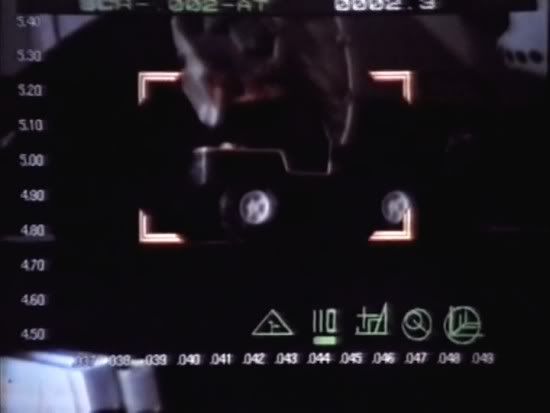
SCIENCE!!
Up on top of the bookcase? Is Robosaurus Jr. supposed to be levitating? Growing? Maybe? I don’t know. I’m not sure the writer/director really knew either. “Whatever,” I can almost hear him saying as he waved the question off. Hearing some noise, David comes into the room to again find Robosaurus Jr. positioned other than where he left it. Only now it’s ‘crushing’ the toy jeep in its steel jaws, as the figure in his dream seemed intending to do.
I’ll spare you yet another round of David’s pointless and overly explanatory narration when he sees this. Bewildered, he again shoves the toy back in to the closet, this time propping a chair against the door. He leaves, and gasp Robosaurus Jr. again emerges of its own volition and moves around the room in a manner *cough* weirdly reminiscent of a remote control toy. Man, that just gets spookier (or cooler or whatever the hell it was meant to be) every time it happens.
Only half an hour in?! Egad. Let’s speed things up here.
- In a big high rise building, and despite it being daytime, we cut to David meeting (I guess) a psychiatrist over a long table. The room is almost completely dark and sports a huge overhead fan. This is pretty obviously meant to evoke the scene in Blade Runner where Harrison Ford subjects Sean Young to the Voight-Kampf test. As usual, these overt references invite comparisons which do not accrue to our current subject’s benefit.
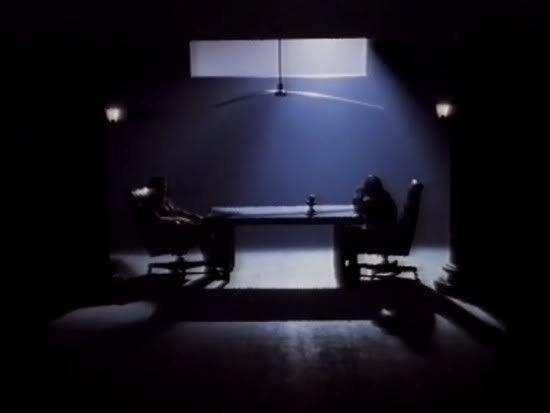
- David tells the psychiatrist everything that’s happening to him, including the self-moving toy. He also expresses his fear that he shouldn’t be carrying a gun if he’s cracking up. Nothing ever comes of this. Is this guy supposed to be a department shrink? You’d think so. However, you’d also think such a person would be recommending a leave of absence for a clearly troubled officer. Again, though, nothing further is heard of this.
- SHIRTLESS MIDGET RIDING A TRICYCLE!! Uhm, OK.
- A big truck heads down the street. Up on a balcony is Jerrod, the Colonel’s henchman, with one of the rocket launchers. I think the pretty clear implication is that he’s the guy who wacked Davey. Anyway…Boom! (The sound of each moment of still being alive.)
- The explosion is done in miniature on a model street scene. Because of the blast effect, the quick shot of the miniature is fairly convincing. However, they then cut back to it momentarily and because the explosion is over, the ersatz nature of the miniature is now almost comically apparent. Who the hell edited this thing? Seeing how this second, rather pointless shot undermined the effect, why would you leave it in there?
- Jerrod sings a merry, old-fashioned tune as he executes his villainy. Yes, he’s one of those crazy cheerful psychopaths, we get it. Finished, he calls the Colonel to report, using one of those gigantic ‘90s cell phones. Did they really think that’s still what phones would look like 20 years in the future? Brother. Anyway, he reports that the aforementioned Diaz Brothers are no more.
- David’s team is soon investigating the scene. The massive size of the explosion is due to the fact the truck was full of ordinance. Because the Diaz Brothers were also arms merchants, of course.
- Still worried about his mental state, David is just about to ask Somes for a leave of absence. However, at this exact moment (go figure) Gina arrives with a piece of the rocket, which—are you sitting down—happens to match similar pieces left behind when Davey was killed!! Who’da thought it? Needless to say, David drops any plans to ask for time off.
- A bit crazed, David begins to badger the crowd for witnesses. Unsurprisingly he gets no takers, but is suddenly taken aback by…bum bum bum…the presence of The Stranger standing right before him.
- Questioned as to what he saw, the Stranger establishes his bona fides as an Immortal by loudly declaring the amazing things he’s witnessed: “I saw the last dragon slain in Britain! I saw Joan of Arc call out to God! I saw a Dutchman stare through a new glass, and a German realize for the first time that Man could fight disease and win! I saw attack ships on fire off the shoulder of Orion!” I might have gotten one of those wrong, but he continues in that vein for a while longer.
- By the way, this is standard stuff for any Immortal Person on a TV show or movie. They always personally knew every single important historical personage and personally witnessed every single great historical event. Indeed, as we know, the Stranger was part of the reason many of these events occurred in the first place. Aside from Stonehenge and the Trojan Horse, he was probably involved in the creation of many other gigantic historical artifacts, such as the Great Wall of China, or the Pyramids, or Beethoven’s hair.
- As his litany finally comes to a close, the Stranger turns serious, looking at David and solemnly reporting, “but I’ve never seen a man who needed to heal himself as much as you do, David.” That’s right, despite witnessing for thousands of years every great and calamitous event in human history, David Nash is the single most emotionally damaged guy the Stranger has ever seen. That seems likely.
- Failing to get anything sensible from the Stranger, and irritated by his Yoda-speak (“We have a destiny to fulfill,” etc.) and the fact that he somehow knows David’s name, David arrests him. I assume the charge is being Unlawfully Elliptical to an Officer.
- As the police car bearing the Stranger leaves, the camera shifts to another car sitting a very short distance off. This holds Jerrod and the Colonel. Sure, why wouldn’t they want to show their faces at the massive investigation of the crime scene? That totally makes sense.
- The Colonel waxes nostalgic about his salad days, when he supplied “international terrorists” who “cared about the world” rather than lowly gangbangers. However, his attention is then drawn to David. Knowing The Hero when he sees him (and confirming that Davey died during a product demonstration they conducted, lest we were still in doubt), the Colonel orders Jerrod to kill David if he gets too close. In fact, being the villain, he hisses “Kill him!” like someone doing a bad Gollem impression. This all established, the two drive off.
- David and Gina are soon listening to a departmental weapons expert expound on the rocket fragment they found. This guy is amusingly played by a youngish, uncredited R. Lee Ermy. Ermy was in the process of building himself an acting career following his stint as a Gunnery Sgt. in the Marines, taking small parts such as this and one in the woeful killer fish movie Up From the Depths. Eventually, of course, he garnered his star-making role in On Deadly Ground, although a few might also remember him as the drill instructor in Stanley Kubrick’s Full Metal Jacket.
- Ermy naturally confirms that the rocket is so rare that it pretty much had to come from the same source as the one that killed Davey. Well. That’s convenient.
- Back at the station, the Stranger is being booked, having identified himself as one Jeremiah J. Jonas. David talks to the department’s records guy to check on Jeremiah’s background, only to learn that he has no record of any kind. Somewhat amusingly, the records guy cites the phone book (!) as one of several resources that contain no reference to such an individual. Indeed, the guy is so perplexed at Jeremiah’s complete lack of a record that he asks David, “Did you just dream him up?” Pretty ironic, eh? Eh? By the way, neither of them even mention the super-crazy possibility that the suspect might have just given them a fake name or something.
- Soon David is questioning Jeremiah, who is ensconced in the precinct holding cells. David asks him how it is that there is no official trace of his existence. Presumably this also means that this is the first time Jeremiah has gotten himself arrested in pretty much decades, right? I mean, there’s definitely a record on him now, correct, given that they booked him and everything?
- “I was born in a Mesopotamian village,’ Jeremiah shrugs, “at a time when records were not so good.” When David looks skeptical at this seemingly zany statement, Jeremiah replies, “I’m older than I look.” Ha, he is, get it? Because he’s immortal and doesn’t look thousands of years old. Zing.
- The ‘comedy’ continues when Jeremiah pins down his age as being 2,356 years old. “Next month, 2,357. And in just six hundred and forty four years, I’ll be 3,000.” Oh, my sides. The wackiness.
- David is unamused by all this (why should he be different), although he never seems to just consider that the guy is just nuts. Instead, he threatens to keep him in the cell pretty much forever, until Jeremiah spills the beans. Funny how they keep telling us how the cops are even more hamstrung by spurious civil rights in the future, and yet Jeremiah can be arrested and held without limit for seemingly no crime whatsoever.
- In a moment that presumably inspired awe in few viewers, Jeremiah warns David that “The Blossoming is about to come!” (Personally, I would have gone with the Punkybrewstering.) Wow, the Quickening is sounding a lot better now, right?
- David returns home in his own ratty car. First, of course, he pauses to stare pensively ahead. This is aggrevated—not to mention aggrevating—when he spies some young boys playing by an open fire hydrant. Not to totally blow your mind, but this triggers memories of Davey speaking of playing in water. Music allows us to glean, god-like, that these memories make David sad. Man, that plot thread just gets old.
- Thankfully, his chronic moping is interrupted when Nicole suddenly sticks her head in the window. I’m starting to think maybe she likes him, but I’ll need another six such scenes and several blocks of expository narration before I’d be willing to commit to such a theory.
- Perhaps having decided that the demure thing isn’t working (well, for David; it would certainly work for any other male on the planet if the woman looked like Joan Chen), Nicole now gets a bit more flirtatious. She muses about taking off her clothes and joining the boys in the water spray. “I’d have to arrest you,” David replies. “Handcuffs, the whole thing?” Nicole asks, before breaking out in a grin. “That might be fun.” At this point the whole ‘magically turning a toy into a giant robot’ thing is taking second place in the fantastical department to David’s continued disinterest in Nicole’s overtures.
- The two enter their building, and we cut to David’s apartment, where Robosaurus Jr. is trundling about on his own. He comes to a halt right before the front door just as it’s being opened, apparently just to freak David out. Robosaurus Jr. Kind of a dick.
- Nicole asks about the object, and David explains how it a toy Davey and he built together, also mentioning how it’s begun moving around seemingly on its own. Nicole does that thing where she silent tiptoes back out of the room, and…oh, no she doesn’t. I guess she thinks, or at least is pretending to herself, that he’s kidding. However, this whole thing works to her benefit, as David now feels like he has to get out of the apartment.
- He invites here to go to an ice bar, which David explains is “a good legal way to get cool.” Er, doesn’t Nicole live in this universe, too? Why wouldn’t she then know of such things? If they wanted to explain what ice bars are—because again, we’d be too dumb to just figure it out for ourselves, especially after we saw the place—why not have Nicole state that they are hard to get into, and have David reply that he knows a guy who owes him a favor. There, that took me five seconds to come up with.
- Anyway, the ice bar is—are you ready to have your mind blown?—basically a jazz club where each small table holds a big block of ice. That’s a somewhat clever idea, if you accept a world again in which there is but small supplies of electricity and no A/C. (Don’t ask how they make all this ice then, though.) However, the room is quite cavernous, which presumably would make the ice less effective in the long run. I guess coming up with an idea is hard enough. Thinking it out would be just crazy hard.
- Cut to the club. David and Nicole are finally spending a relaxing evening together—well, assuming that David once more blathering about his son’s death constitutes relaxation (way to establish a mood, dude)—when David takes a closer look at the band and notices that the swinging sax player is…gasp!…none other than Jeremiah. Having caught David’s eye, Jeremiah heads up the stairs, still playing merrily away.
- By the way, I like how during the story David describes the fatal weapon as being a “rocket-firing device of some kind.” Cops, always up on the latest lingo. Nicole, for her part, seems to have never heard the story before, despite the fact that it happened but a year ago right outside the building she lives in. Even if she had moved in since that happened, you’d think that one of the other neighbors might have mentioned such a thing. I don’t know, it seems like good gossip fodder.
- So, great date for Nicole, hearing about the murder of her date’s son, and then having him abruptly jump up and leave to chase after a guy. Maybe on the second date she can hear the details of how David’s marriage collapsed following Davey’s death, augmented with an anecdote or two about his subsequent crippling emotional and sexual dysfunction. Always a fun time to be had with David Nash.
- So David is seen escorting Jeremiah out the club’s entrance, passing on the way AN INEXPLICABLE SHAFT OF SMOKY LIGHT BEAMING THROUGH THE SLOWLY TURNING BLADES OF AN INDUSTRIAL FAN. As for Nicole, David calls in to have a patrol car come to the ice bar and give her a ride home. (Cheaper than paying for a cab, I guess.) Fun date!
- David pulls over at a deserted location and asks Jeremiah how he got out of the cell. (Bail not being an option, I guess.) Jeremiah replies you learn a few things when you’re thousands of years old. David then begins manhandling Jeremiah, because, you know, he’s a cop on the edge. I mean, not on the edge enough to actually hit him or anything, but enough to grab his jacket lapels, shove him a bit, stuff like that.
- Here we get the inevitable factoid that Jeremiah is immortal to natural causes, but can still killed by violence. Because, you know, if they went to series they’d want to be able to place him in danger when they needed to. Aside from it seeming a tad farfetched that he would never had suffered some fatal event in 2,000 plus years, especially when again he was apparently always in the mix of whatever Great Events were going on, I can’t help noticing that he was smoking a pipe earlier. I’m not a huge freak about smoking, but they should probably at least mention something to explain how he could presumably smoke for millennia and get away with it.
- More Yoda-stuff; “You have to start listening with your heart, and not your head! You have to start listening to your dreams!” Blech. Thanks, Deepak. David finally concludes that Jeremiah is nuts, and that he’s nuts for listening to him. He’s wrong, of course, but that’s still something he should have concluded a while back.
- Disgusted, David drives off, leaving Jeremiah behind and still handcuffed. Oops, there’s a ream of paperwork he’ll have to fill out. Of course, Jeremiah effortlessly pops the cuffs off. The only surprising part is that he doesn’t say something like, “There, just like I taught Houdini that one time!”
- Meanwhile, Jerrod has gone to the police precinct while disguised as a detective. He asks R. Lee Ermy for a copy of the forensics report on the explosion scene, presenting fake paperwork to account for this request. This all to learn what David knows and such.
- Late that night we see Jerrod entering David’s apartment building. He then gets into Our Hero’s flat with a doohickey of some sort. Ominous music plays so that we know this is bad. How would we possibly know otherwise? He leaves what is apparently a brick of C4 right by the front door, one which embedded in it has a glowing red LED display. It also beeps as the seconds count down. (!!!) Yeah, nobody would notice that. Anyway, bum bum bum.
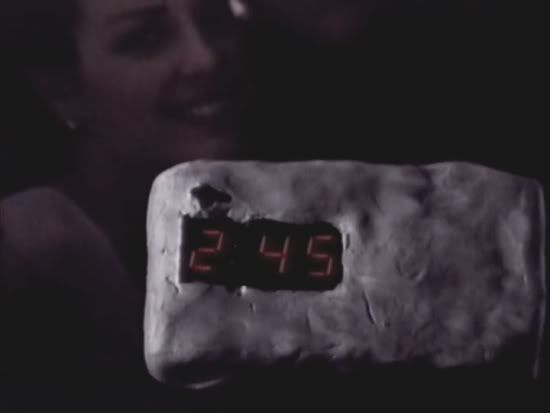
Johnny’s First Bomb, from Fisher-Price.
- Meanwhile, David is again tossing and turning in the bedroom. He is, of course, having The Dream again. Why didn’t Jerrod just walk into the apartment and shoot him or something? Because then Our Hero would be dead, I guess. Anyway, to OUR VAST SURPRISE Robosaurus Jr. rolls out of Davey’s room and grabs the bomb.
- As usual, The Dream each time gives David a bit more information, because eventually, or so I hope, the movie has to end. This time Robosaurus’ robotic POV view approaches a trailer truck adorned with a shipping logo, featuring a turbaned gent and a lamp, presumably Aladdin. The dream ends with an explosion, waking David up. Suddenly out the window he hears a nearby matching explosion, presumably from Robosaurus Jr. having taken the bomb out onto the street to explode harmlessly.
- Sure enough, we get to see Robosaurus Jr. rolling away from near the explosion site. Oh, now I get it.
- POINTLESS NARRATION!
- Apparently I was in a boredom fog, and The Dream revealed that jeep from which the deadly missile was fired then hid inside the Aladdin truck. David heads to the precinct and tells Gina he has new info on his son’s death, and asks her to research the logo. (Amusingly, the sketch he gives her looks like something a kid would draw. I confess I would be able to do little better.) Gina is suspicious as to the provenance of this sudden new data, but loyalty to her partner wins out.
- David is so excited that he kisses Gina excitedly on the lips before leaving. To him, it’s a mark of exhilaration. Gina, however, touches her lips in wonder after he leaves. Why, could it be that brassy tough dame….
- Back at The Compound, the Colonel is chewing Jerrod out over the failed assassination attempt. Again, I would have gone with the, “step into the apartment, shoot the sleeping man” plan. Indeed, the Colonel pretty much just accuses Jerrod of cowardice, with the idea being presumably that he is unable to kill except from a safe distance. If so, that actually explains why David is still alive, so kudos. The Colonel dismisses Jerrod from his sight, with the latter predictably pissed.
- Cut to the Ice Bar, which is closed for the night. Only Jeremiah is there, playing his sax and waiting for David to make his destined appearance. This naturally occurs, since we’re finally heading into the film’s final half hour, and presumably a good ten or fifteen minutes will involve watching Robosaurus’ rampage, since that’s what motivated the making of this thing in the first place. Really, the entire rest of the movie is window dressing for that, after all.
- David and Jeremiah are next seen on a crowded escalator somewhere, presumably because somebody thought it would make for a cool shot. Otherwise it’s utterly unmotivated. Jeremiah is explaining about the “Travelers,” which are those like him. The two discuss all this magic stuff for a good stint, despite the fact that there are two uniform cops standing on the escalator literally two feet behind them. Sure, why not?
- The scene contains an actual subtle gag, though, which undoubtedly explains the escalator thing. As they near the bottom, David and Jeremiah dip low enough to reveal that while the aforementioned street cops are wearing black caps and full sleeved shirts, they are also wearing matching shorts. This is the first sign we’ve seen, fashion-wise, that backs up the idea that it’s hot all time. (David, for instance, is even now wearing his nearly omnipresent full-length leather coat.) Kudos to the director for not zooming in on the shorts or trying too hard to make sure we get the gag. It’s a little late, but we could use more of that sensibility.
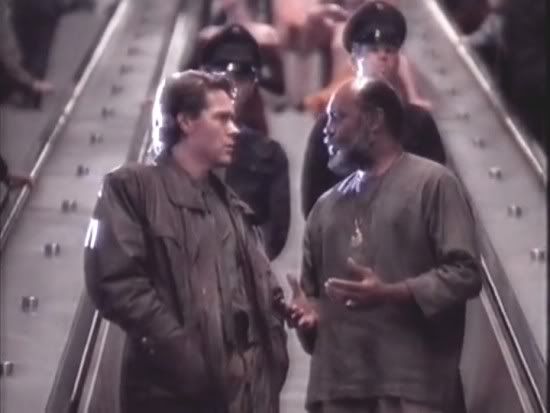
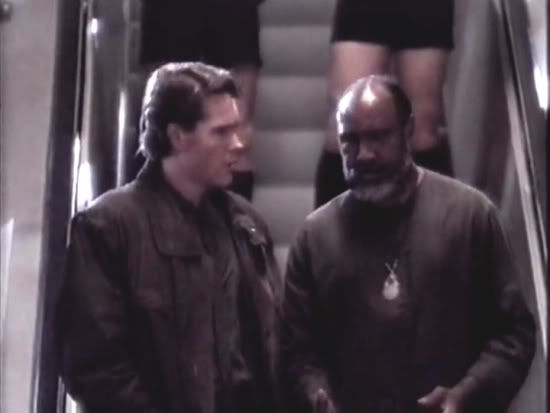
- Jeremiah explains that David will have seen the object of his Transformation in his dreams. Hmm, what could it be….
- David mentions Robosaurus Jr. “This is the object that your son loved more than anything in the world,” Jeremiah explains. (Yeah, screw you, Dad.) “It made him feel protected. It made him feel secure. Now, just suppose that toy could do for you what it did for your son?” Uh, stand uselessly by while he’s blown into a million pieces?
- David somewhat realistically decides he can’t believe any of this. And indeed, it’s all pretty retarded. “The Transformation cannot happen without your help!” Jeremiah warns as he leaves.
- David gets a call. Gina’s got the info on the truck. However, she won’t cough it up. The squad is up in arms over the bizarre appearance of this new evidence. (Because new evidence and/or witnesses never ever show up long after the fact.) He asks her to meet him at Louie’s, the cop bar, and he’ll explain the whole, crazy story.
- It turns out Gina isn’t entirely convinced by the “I saw it in a dream” thing. Yeesh, what a ballbreaker. I have to admit, though, that this line of evidence may just fall short of providing sufficient probable cause to get a warrant issued. Damn legal red tape!
- Meanwhile, they act like if Gina doesn’t cough up the name of the trucking company, that David would never be able to find it any other way. Even stipulating that the Internet doesn’t exist in this world, couldn’t he just hire a private detective or research firm to dig up the same information? We’re not exactly talking military secrets here. It’s the logo of a public company.
- Anyway, despite her skepticism, Gina takes a leap of faith and gives up the name. It’s Three Wishes Trucking, by the way, which is surely the absolutely dumbest name you could associate with a genii and lamp log. What would three wishes have to do with trucking? At least “Aladdin” would get you high placement in the Yellow Pages.
- By the way, the company is owned by…bum bum bum…the Colonel. Apparently to get to the end they needed to tie him to the crime in the most obvious and unbelievable fashion possible. What, the Colonel isn’t even smart enough to not use a company owned in his own name on a job? Man, that’s some lazy writing there.
- Somehow the Colonel’s reputation is beyond reproach, however, despite the fact that he lives in a huge gated and barb-wired compound secured by an entire squad of heavily armed men, and oh yeah, the fact that Gomez’ car recently blew up (via a rocket exactly like the ones they’ve been investigating) right outside said gate, with four people inside it when it went. Yep, no cause for suspicion here. Really, they couldn’t even be bothered to play the “he’s got lots of political connections” card? Lazy, but nowhere near as dumb.
- So Gina urges David to take a step back, and he’s all like, no, I’m going now, blah blah. Still, amazingly logic wins out. She reminds him that they’ll want a clean bust to ensure the Colonel doesn’t go free, and David agrees to do things by the book.
- However, it’s all a ruse, and next thing David is rolling up to the gate and telling the armed guards (it turns out this is the official headquarters of Three Wishes Trucking!!) that he needs to talk to the Colonel. He flashes his badge, which would mean absolutely nothing, and of course the guards don’t bother asking if he has a warrant or anything. Indeed, the last thing you’d do is voluntarily let a cop in, because at that point he can snoop around almost to his heart’s content. You’d think a crime lord would train his guards a bit better.
- So David is escorted inside, thus allowing him to observe all the guards and guns and whatnot, which might strike one as a bit strange for a trucking company. This does lead, however, to POINTLESS NARRATION!!
- I particularly like when the guards lead him through a warehouse filled with what are clearly weapons crates. Moriarty this guy ain’t.
- Anyhoo, David meets with the Colonel, and they verbally spar a bit in a highly lame fashion, although again David isn’t asked for his warrant or anything. So much for the idea that criminals in this universe are always hiding behind the law. Finally, the Colonel brings David two huge printouts that supposedly prove none of his trucks had ever been in the area in question. David takes these and is escorted out.
- However, inside the Colonel is stoking up Jerrod’s ire, and tells him to go kill David. Really? Right after he was at your compound questioning you? Yes, that wouldn’t rouse suspicions.
- So David returns home, and finds Gina waiting for him, and gasp Jerrod suddenly drives by and tries to run David over. (OK, still a coward’s way to ‘personally’ kill someone, so I’ll buy it). However, David takes but a glancing blow and stands up to fire into the car, driving Jerrod off. However—are you sitting down?—it turns out that Gina got hit more squarely. Or, maybe, it’s that she’s a little thing that weighs a good hundred pounds or so less than David does and thus a bit more fragile. Anyway, she’s mortally wounded. Oh my gosh, a cop movie in which the lead character’s partner is killed! What will they think of next?
- So there’s that thing where the hero listens to his dying partner’s last words, because that’s obligatory. Here Gina gasps just before dying, “I know you’ve always thought of me more of as a boy than a girl. But deep down, really deep down, I’d was kinda hoping that we’d hook up someday.” I must admit, I thought this was HILARIOUS. Yes, dump your dying unrequited love on the guy who just got you killed and who already has been almost going nuts over the last year carrying around guilt from when his son was murdered. Gina Morelli, ladies and gentlemen.
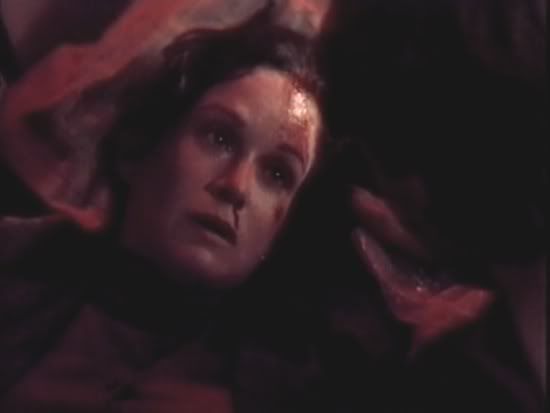
“I know, I know. It was a million to one we’d go to series. But I couldn’t take that chance!“
- Season Hubley sells this much better than it probably deserves, by the way. She actually makes the scene fairly affecting. Thank goodness they forewent any narration after this, in which David explained that Gina’s death made him sad and stuff.
So needless to say, it’s finally time for the big action finale. Well, not quite yet, as I guess they had a few more minutes to kill. So David learns that Somes want to put him on psychological suspension, etc. The flat out most ridiculous thing is that Somes just immediately assumes Gina was killed by a random drunk driver, and that it was in no way an attempted homicide. You’d think the death of a fellow cop, and the near death of another, would draw a bit more attention than this. Apparently not.
All this is clearly filler, however, wasting time until we reach the proper minute on the clock to get to the inevitable climax, and also to rather clumsily explain why David has to go it alone. Having turned in his service weapon, we cut to David sawing off the barrel of a shotgun. (This makes it nearly useless as a range weapon and thus not the thing to use against men inside a gated compound.) Conveniently, he does this with his apartment door apparently open (!!!), allowing Nicole to wander in for a last scene. One that lasts about twenty seconds and doesn’t amount to a damned thing. Good thing they managed to get that in there.
And so we eventually see David set out for the Colonel’s compound. (Somes wouldn’t believe that the Colonel is up to anything, although his men in the compound are clearly visible from the street and bearing the exact sort of super-rifle that Gomez was caught with. What does it take to draw police attention in this universe?) Even more conveniently, for the plot anyway, Tyrone the gangbanger is there with his crew to pick up their weapons, putting all the bad guys in one location.
David arrives. Ducking for cover, he finds Jeremiah waiting for him. With David desperately outgunned, Jeremiah attempts to persuade him that The Transformation is the only thing that can save him and bring the Colonel to justice. David, for his part, admits this might be a suicide mission. He’s sick of being powerless against the wicked. “You don’t have to be powerless anymore, David!” Jeremiah replies. “Give me thirty seconds of the rest of your life!” Either he’s here to push The Transformation, or else Amway.
However, David just can’t rouse the necessary belief blah blah. I have to admit, I laughed when Jeremiah explained that Nash would have to access “an underused portion of your brain.” Given the evidence before us, I’d have to say that covers a lot of real estate. Turns out he specifically means “the place where dreams come from,” though. David tries and fails, however.
In order to goad David into finding it within himself, Jeremiah steps out and exposes himself to the enemy’s guns. Worse, he goads a just arrived Jerrod, clearly putting his immortal life at risk. This finally focuses David’s attention—luckily, as villains do, Jerrod completely, comically drags out the whole ‘shooting Jeremiah’ affair—and to the surprise of not a single person in the known universe, Robosaurus finally makes the scene.
Jeremiah stands laughing next to the giant automaton. This seems unwise, as that means he’s pretty much in the line of fire of all the panicked men shooting at the thing, not to mention the obvious ricochet risk. Still, Gina was the film’s sacrificial lamb, so nothing happens to him.
So we watch the roaring Robosaurus move around in his limited fashion, breathing fire and knocking over a suspiciously flimsy guard post—F-Troop!—and (his number one demolition derby parlor trick) crushing vehicles in his mighty hydraulic jaws.
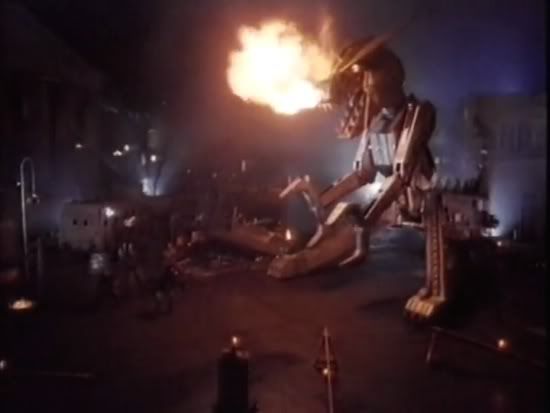
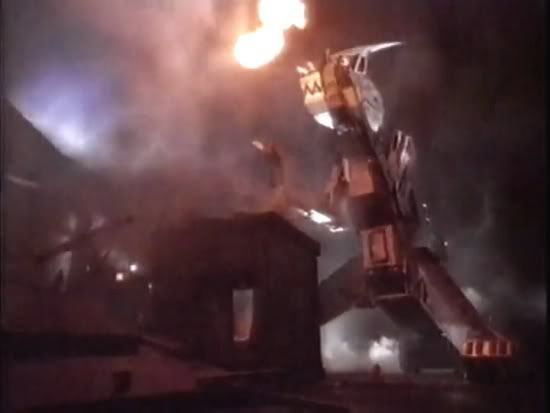
At one point he even saves David’s life by sticking his giant metal mitt through a convenient window and plucking up Jerrod. With Jerrod safely caught, advocate of non-violence Jeremiah (was that his policy when he helped the guy make the Trojan Horse?!) is able to demand a ‘comically’ craven apology from the hoodlum.
By the way, had ANY ten year-old kid written this, you know Jerrod would have ended up being mulched in those titanic jaws. Stupid movie.
So David chases after the Colonel, who conveniently enough is fleeing down a private escape tunnel and thus alone. You know, I always find it weird when an action movie climaxes with the hero chasing down or fighting some old-timer or, as in this case, some wheezing fat guy. See Steven Seagal whacking the clearly helpless, 60 year-old Michael Caine in On Deadly Ground. I mean, this match-up here doesn’t offer much in the way of suspense, does it?
So the Colonel makes it to the street, and carjacks a battered old station wagon. (!) He drives off to apparent safety, but suddenly (who’da thought) Robosaurus magically appears before him. Before he can flee, Robosaurus grabs up the car and crushes it, then drops it to the ground, where it explodes. The Metal Marvel then roars in triumph, and returns to being Robosaurus Jr. So we last see it, waiting for the first episode of a show that tragically would never come to pass. Robosaurus, we hardly knew ye.
Chastened by the crime scene evidence, Somes returns David’s gun and badge. “Maybe someday you can teach us all to dream again,” he muses. “It might make us better cops.” Bleeech!!! Then they have David go over to Jeremiah. They establish that now that David has the magic he’ll always have it, and that Jeremiah plans to stick around awhile, etc. “Did I ever tell you about my good friend Confucius?” Jeremiah asks, as Our Heroes set off towards their glorious future.
Ronald Moore, I have an idea for you.
******
Unsurprisingly, the whole Robosaurus climax is a goodly part of why I chose Steel Justice as my roundtable subject. To me, a great bad TV pilot will likely display two key problems with its central concept; one, it will be stupid on its face, and two, it will appear unsustainable. This isn’t always true, but it certainly it here.
That the Robosaurus thing is stupid is a given, so let’s move on to the second point. When thinking about a potential series, it’s clear that one of the most basic issues is whether the central premise would be problematic to replicate on a weekly basis.
This is especially true for a ‘high concept’ sort of program, by which I mean one that isn’t a continuing, ongoing story as is more popular today. In this latter model, episodes generally act as sequential chapters in a larger, overarching narrative. Games of Thrones, maybe, or Justified, or nearly any acclaimed series on the air right now.
Steel Justice, however, is based on the more traditional model wherein the individual episodes are largely self-contained and interchangeable. If you’re doing that sort of show, you need an idea that can support some level of repetition week in and week out. Bad pilots often don’t provide such a framework. Indeed, nearly every year there’s some series that actually makes it to air that seems to suffer from a similar deficiency.
I always think of Cursed, a sitcom where actor Steve Weber was, well, cursed to have bad things happen to him. The show was barely on the air before its central premise was abandoned and program renamed The Weber Show. It still quickly went off the air, but again, the ‘cursed’ thing was on its face seemingly too limited to sustain a continuing series.
Indeed, at the time I’m writing this, a pilot has been announced for comedian Will Forte entitled Rebounding. The premise is, to quote, “A man recovers from the death of his fiancé with the help of the idiots on his pickup basketball team.” Let’s say that this show makes it to air and proves popular, running for, oh, five years. Are you really going to have 100-plus episodes in which the central plot device is a guy trying to get over his fiancé’s death?
I don’t know, that doesn’t seem like it would be very sustainable premise. Putting it one way, it’s more of a movie idea than a series idea. How long can they play that particular card, week in and week out? Hell, Steel Justice is a single film wherein a guy is devastated by his son’s death, and by about halfway through you want to shake the guy and yell “Snap out of it already!”
That’s not even our current subject’s main issue. Quite a few—perhaps most—network sci-fi series in the ‘80s and ‘90s featured a transformation or manifestation of some power or technological wonder deployed that would be largely put off until the climax of the episode, at which point it would be used to resolve that week’s plot. The Incredible Hulk, Fox’s Werewolf, Automan, Highwayman, Shazam!, Manimal, etc. There were a lot more than that. And for every show that made it to series, there were probably a dozen pilots for similar things that didn’t.
Even by the rather low standard set by the above programs, Steel Justice’s Robosaurus is pretty retarded. And that’s even without factoring in its whole Big John, Little John aspect. It’s the sort of thing that actually makes you suspect that no one involved in the project even for a moment thought it could possibly to go series. And even aside from the sheer inherent goofiness of Our Robotic Hero, there’s its patent unwieldiness as a physical prop.
Again, Joe Bannerman immediately picked up on this. A 40 foot long, multi-ton gadget can only be deployed outside (or in a very, very large interior space with industrial-grade flooring). And once it’s in place, it’s just barely movable. I mean, the Robosaurus did move, presumably through remote control or via a hidden driver. However, it also moved quite slowly, and in a pretty limited, herky-jerky fashion. This would require that its action scenes be quite contained.
Even exaggerating its mobility via, say, judicious applications of Offscreen Teleportation would be difficult. There just wouldn’t be enough time on a tight production schedule to be constantly shooting the extra footage such a thing would require.
Moreover, you’d have to think that even transporting the actual Robosaurus would a major pain in the ass. After all, it weighted 31 tons! This means the most likely scenario is that Robosaurus would be filmed nearly every week on the same backlot, hurriedly redressed to the extent possible so as to hopefully distract viewers from the noticing the same buildings appearing over and over and over again. And wouldn’t a mechanism this complicated be likely to break down on occasion? Imagine what a production nightmare that would be.
Lou Ferrigno’s Hulk could pretty much go anywhere Bill Bixby did. Robosaurus, clearly, could not. And how was Robosaurus Jr. always going to be on hand for the climatic transformation? Would David travel with it in the trunk of his car? Carry it in a large suitcase? Sheer convenience indicates that they would have given the toy the power of teleportation when needed. Admittedly, it’s already been suggested that the Robosaurus is ‘alive’ in some manner, and it has in small ways already moved itself around. Still, how fast would that little thing be? Wouldn’t David have to always be imperiled but a block or two from wherever the toy was at?
A moment of contemplation raises other issues. How would David explain to his co-workers the constant appearance of Robosaurus? Would reporters start following him around to catch the thing in action when it inevitably appeared? Wouldn’t criminal attempts to fight the thing inevitable result in numerous bystander deaths? So many questions, so few less than completely ridiculous answers.
I guess the easiest thing would be for David to learn to transform pretty much any item as necessary. However, that kind of invalidates what is set up here, how David can transform Robosaurus Jr. because it has so much emotional resonance for him. However, as Jeremiah was clearly meant to be a continuing character, it would make sense for him to help David develop his powers, or even evince additional ones as the plot required. Yes, that would be sloppy and stupid. However, when the core concept of a show paints the series into such a tight corner, there’s likely no pretty way out. And it would mean that Robosaurus could be saved for ‘special’ episodes.
Plus, again, there’s the inescapable fact of how stupid the whole thing is. I know I’m not the only one bewildered by how Disney spent three hundred million dollars on a John Carter movie, only to then refuse to put the key words “of Mars” in the title because they believed that audiences hated things set on the Red Planet. As, of course, a John Carter movie would have to be. That’s kind of the whole idea.
Well, check out this original TV promo here (it’s the second commercial, right after the Dr. Pepper ad).
Notice anything? Yeah, they play up Joan Chen, even using the line “Two people, one kind of justice.” This is sort of odd, given that the Chen character is really barely in the pilot. And, oh, yeah, they also skip entirely over the fact that there’s a giant robot dinosaur in there, or that it features magical powers or an immortal guy, or really, much of anything that the pilot was really about.*
[*The block of commercials also features an ad for the short-lived sci-fi cop show Mann & Machine, one of about a zillion network pilots and series over the years where a cop is teamed up with an android partner. Actually, given the traditional TV proclivity for stupid titular puns, I’m a little surprise that the hero of Steel Justice wasn’t named David Steel. You can bet somebody at least suggested it.]In the end, if you yourself think your central premise is entirely risible or audience-unfriendly, maybe that isn’t the sort of thing you should base a movie or TV show on.
*****
Next, let’s watch this sarcastic summation for the movie. Given the logo bug, this is presumably from ABC’s 2004 The Best TV Shows That Never Were! special, as opposed to CBS’ exactly similar The Greatest Shows You Never Saw special from 1996. Both specials can be found on YouTube, by the way, at least until the networks’ lawyers make them pull them down.
Anyway, both specials were sort of the forerunner of the snarky retrospective, We Love The ‘80s-type fare that VHS has basically lived on the last several years. I saw both of these at the time they were broadcast, and thought an ongoing TV show presenting horrible TV pilots and series episodes would be terrific, not to mention really, really cheap. It would be the sort of thing they could show on the Syfy Channel,* if only they actually showed science fiction-related stuff.
[*Couldn’t Syfy have at least called itself SyFy? The lack of a capital F makes it look like it should read ‘siffy.’]It should be noted that the segment seen here gets its key plot detail entirely wrong. The idea that the Robosaurus is actually the reincarnation of David’s dead son is positively horrifying, so at least Steel Justice didn’t go that far. See, it could have actually be even worse, sort of a mopey, action version of My Mother the Car.
*****
Steel Justice was potentially an international star-making opportunity for its lead actor Robert Taylor. (The Australian actor, not the middle rank film and TV star of an earlier age.) As a caution for anyone wishing to learn more about Mr. Taylor after reading this review—assuming such a thing might occur—please note that he appears at the IMDB as both Robert Taylor (ll) and Robert Taylor (Vll). The hyperlink from Steel Justice leads to his Robert Taylor (ll) entry, which severely shortchanges his career and the volume of work he has done.
Indeed, Mr. Taylor just this very week appeared in Entertainment Weekly’s special “Summer Must” issue, in which the now significantly more veteran actor is oddly touted as one of the possible breakout stars of the season. This honor has been afforded him by dint of his starring, titular role in the upcoming A&E cable series Longmire. The period western, set in Wyoming, will co-star Katee Sackhoff and Lou Diamond Phillips. No word on whether Mr. Taylor has arranged a part for his old friend Robosaurus.
Mr. Taylor has starred in an impressive roster of TV programs in his native Australia. After the failure of Steel Justice here in the States, he returned down under and his career continued in this manner. His most prominent role worldwide was as Agent Jones, one of Agent Smith’s artificial henchmen in The Matrix. It should be noted that the latter was a somewhat more successful attempt at futuristic sci-fi than was our subject today. Genre buffs, meanwhile, may recognize Mr. Taylor from his smallish part in the killer croc movie Rogue.
It must be said, however, that in Steel Justice Mr. Taylor pretty much sucks. How much blame for this can be laid at his door is debatable. For instance, was his ‘now you hear it now you don’t’ New Yawk accent his idea, or that of the director or the script? Yet surely his continuing career suggests one shouldn’t judge him entirely on his work here. And to be fair, playing a character nearly totally defined as “quite sad his son is dead” doesn’t allow for a very large entertainment factor.
In any case, he was quite unknown in the States at the time Steel Justice was broadcast. Per tradition, the neophyte star was therefore supported by a slew of familiar names and faces. This being the ‘90s, this included an underused roster of minority actors. Indeed, they clearly used the checklist method here; black guy, Hispanic guy, woman, Asian woman, etc. All of these supporting actors embarrassed themselves far less than Mr. Taylor did, and nearly all have gone to have steady careers as character actors.
The most prominent of this support staff was the beauteous Joan Chen. Ms. Chen was then at her career peak, following her role as Jocelyn Packard on the (at least briefly) nation-galvanizing Twin Peaks. The fact that Ms. Chen played a supporting role in an awful TV pilot but a year later—and a mere five years after playing the female lead in Bertolucci’s The Last Emperor—suggests exactly how well her subsequent career went. Still, she remains busy and works to this day, so hopefully she’s at least paying the bills. Ms. Chen previously appeared in these pages for her work in On Deadly Ground.
Immortal mentor Jeremiah J. Jonas was assayed by familiar character actor J.A. Preston. Having arrived on the scene after the heyday of the Blaxploitation picture—a genre the imposing 6’ 2” thespian surely would have distinguished himself in—Mr. Preston took a more traditional route to prominence. To wit, a metric ton of episodic TV appearances and the occasional film role. Some might remember him appearing opposite Fred Ward in Remo Williams: The Adventure Begins. Mr. Preston’s career continued on in that fashion, although he appears to have retired from acting circa 2005.
Also in support of the (at least here) hapless Mr. Taylor was Season Hubley, who played his partner Gina. Ms. Hubley’s own brush with stardom occurred in 1979, when she starred opposite George C. Scott in the theatrical feature Hardcore, and also played Priscilla Presley opposite Kurt Russell in the extremely popular TV biopic Elvis. Ms. Hubley and Mr. Russell were wed soon after; hence Ms. Hubley’s brief cameo as the “Chock Full o’ Nuts Girl” in Escape from New York.
Yet more familiar character actors were marshaled to distract us from Mr. Taylor’s thespic limitations here. John Finn’s most prominent role prior to Steel Justice was as Sgt. Maj. Macahy in Glory. However, his work here more accurately foretold his future. Aside from his myriad episodic TV work, he went on to play recurring cop roles in EZ Streets and Brooklyn South. Then he hit the character actor jackpot by playing John Stillman for seven seasons on CBS’ popular procedural Cold Case. Genre fans, however, may remember him best as Michael Kritschgau, one of about a thousand Men of Mystery on The X-Files.
Our villain was assayed by Roy Brocksmith, the chubby, raspy-voiced character actor perhaps best remembered as the fatally sweaty psychiatrist in Total Recall. Mr. Brocksmith sadly passed away at the age of 56 in 2001.
Journeyman actor Geoffrey Rivas—most famous as detective Sam Vega on CSI: Criminal Scene Investigation—unsurprisingly stayed busy playing ethnic roles. His early credits on IMDB constitute a depressing roster of Juans, Pedros, Joses, Hectors and so forth. Only lately has he been free to play more Sams, Marks and Jacks. Here he played squad member Julio Melendez, noticeable mainly as “the guy wearing the bow tie.”
Keep an eye out as well for a ‘blink and you’ll miss it’ appearance by Al Leong. Indeed, I must have blinked.
Mr. Taylor’s primary costar, Robosaurus, was a preexisting mechanical robot built over a two-year span by Douglas Malewicki. Costing over two million dollars at the time, Robosaurus was 40 feet tall, weighed 31 tons, and as amply demonstrated in this picture, could ‘breathe’ fire. It was piloted from an interior capsule. Presumably the existence of this impressive, if highly goofy, artifact is what caused our subject today to come about.
Why they added the Blade Runner stuff, not to mention the cop and his dead son and the immortal guy and the magic powers and all that, remains a matter of some mystery. On the other hand, TV executives also optioned once Fonzie and the Happy Days gang for a Saturday morning cartoon series, and then stuck them in a time traveling spaceship with a cute space alien chick named Cupcake and a leather jacket-wearing dog named Mr. Cool who caused mishaps when he snapped his fingers. So who knows what the hell guys like that were thinking.
Following the…underwhelming success of Steel Justice, which can surely be more accurately pinned on Mr. Saurus’ less expressive costar, Robosaurus toured the country doing monster truck events (gaining actual pop culture immortality for inspiring Truckasaurus, as seen in early episodes of The Simpsons), and other such gigs, such as appearing at the Universal theme park. Mr. Saurus was auctioned off for $575,000 in 2008, but apparently remains working today, appearing in a 2011 episode of TV’s Pawn Stars. In any case, videos from many of Mr. Saurus’ various live appearances can be found on YouTube.
Steel Justice was produced, directed and co-written by Christopher Crow. Unsurprisingly, Mr. Crow worked mostly in television. The same year he directed this, he also helmed his sole theatrical film. Sadly for him, this was the much derided erotic thriller Whispers in the Dark, which has garnered a paltry 25% positive rating on Rottentomatoes.com. Since then Mr. Crow has mostly focused on writing and producing.


Pingback: Stop me if you’ve heard this one before… « The B-Masters Cabal()